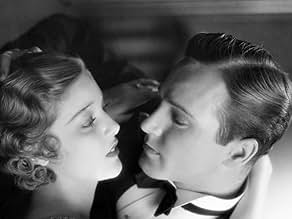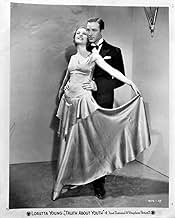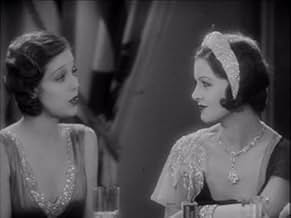Ajouter une intrigue dans votre langueRichard Carewe has raised his deceased friend's son from childhood with the help of his housekeeper and her beautiful daughter Phyllis. He arranges a marriage between the lad and Phyllis, bu... Tout lireRichard Carewe has raised his deceased friend's son from childhood with the help of his housekeeper and her beautiful daughter Phyllis. He arranges a marriage between the lad and Phyllis, but the rascal impulsively marries a notorious nightclub singer known as "The Firefly." The ... Tout lireRichard Carewe has raised his deceased friend's son from childhood with the help of his housekeeper and her beautiful daughter Phyllis. He arranges a marriage between the lad and Phyllis, but the rascal impulsively marries a notorious nightclub singer known as "The Firefly." The femme fatale dumps the boy when she discovers that he has no money, but by then Phyllis re... Tout lire
- Director
- Writers
- Stars
- Jim - Kara's Boyfriend
- (uncredited)
- Headwaiter
- (uncredited)
- Nightclub Patron
- (uncredited)
- Babette - Kara's Maid
- (uncredited)
- Nightclub Patron
- (uncredited)
- Nightclub Patron
- (uncredited)
- Hal - Dane's Pal
- (uncredited)
- Jim Greene
- (uncredited)
- Night Club Patron
- (uncredited)
- Cherry - Blonde Party Girl
- (uncredited)
- Man at Wedding License Bureau
- (uncredited)
Avis en vedette
The conflict begins when David Manners, pledged to marry Young, falls instead for nightclub performer Loy whose exotic, cynical, gold-digger comes as refreshing counterpoint to Young's homespun housekeeper's daughter. Loy lip syncs a couple of forgettable songs and dances passably & briefly, looking gorgeous at all times. Melodies of two better songs of the day, "Get Happy" and "Miss Wonderful," are played during nightclub scenes.
Young's line readings are smooth and natural, especially considering her age at the time. But they are, in fact, rattled off too smoothly to register the subtleties of thought that her character is experiencing, so that when she reaches certain conclusions late in the story, they seem arbitrary. Loy's best moment is an outburst of anger while in the arms of David Manners when she finds out he isn't quite the cash cow she thought he was, but the scene collapses when she hurls a vase at him, and misses by a mile. Manners himself is slightly less wooden than usual, but only slightly. He does manage to get a drunk scene half right.
A few inter-titles illustrate a lingering habit from the silent era, while underscoring in some dramatic scenes reminds us that even in 1930 pure unadulterated soundtrack hiss was not always the case.
To those who find the ending shocking, tut-tut. Surprising, maybe.
It's a 1930 movie, so it's a little stiff and stagy, in production and acting. Loy is wonderful, like a breath of fresh air whenever she's around, glittery and sexy and dangerous. Manners is his usual rather awkward self (when he's staring with lust at Loy, he looks rather like Harpo Marx during his drunk scene in THE COCOANUTS) but he has the leading man looks needed for the part. Young is not as good as she would be in later movies; both she and Tearle are rather stiff. The characters could be fleshed out a bit more; all the exposition is crammed into a long dialogue scene in the first ten minutes of the movie. I would particularly recommend this to Loy fans-it's always fun seeing her as a kind of femme fatal (as she was in several of her early films) and contrasting that image with her good-girl/wifely image later in her career.
Manners arrives home, falling down drunk. The next morning, he hides his interest in Loy, guzzles water to battle cotton-mouth, and goes out to seem more of the "vulgar" Loy. Back home, clueless Young finds a note that drunken Manners dropped, from the gold-digging Loy, accepting his marriage proposal. As it was addressed to "Richard," Young thinks Mr. Tearle is the one set to wed Loy. When Young returns the note to Tearle, he covers for Manners. Marriage, misunderstanding, and related mayhem follow - and, finally, Young finds "The Truth About Youth" is that sometimes older is better.
Don't miss Young's dress in the opening scene; she wears a strategically placed strap-on "attachment" that seems to shout out an invitation to Manners. If he hadn't stepped out to see bare-legged Loy, we might have had a different movie. Manners plays his drunk scene, and the morning after, well; he's almost commenting on those who call his acting "stiff." It's still Young's movie, however, as she becomes the central character. Young and Loy are fun, especially in their nightclub scene. Probably most outstanding is seeing Tearle continue to play leading-man roles into the 1930s.
****** The Truth About Youth (11/3/30) William Seiter ~ Loretta Young, Conway Tearle, David Manners, Myrna Loy
Le saviez-vous
- AnecdotesMyrna Loy was actually a fully trained professional dancer, having studied with Ted Shawn (husband of modern dancer Ruth St. Denis and co-leader with her of the Denishawn company), but "The Truth About Youth" and Warners' all-star musical "The Show of Shows" were among the few movies in which she actually got to dance.
- GaffesDuring Kara's first number at the Firefly Club, she purses her lips and blows a kiss to someone in the audience. It is an obvious lip-sync as she is still heard singing while doing that.
- Citations
Phyllis Ericson: It's about time I began. What chance does a girl nowadays, if she doesn't do this and won't do that?
- ConnexionsFeatured in Myrna Loy: So Nice to Come Home to (1990)
- Bandes originalesIn the Land of Let's Pretend
(uncredited)
Music by Harry Akst
Played during the opening credits
Also played when Phyllis is sitting with Dick and Kara at the Firefly
Also played when Phyllis and Dick are alone at the end
Meilleurs choix
Détails
- Date de sortie
- Pays d’origine
- Langue
- Aussi connu sous le nom de
- When We Were Twenty-One
- Lieux de tournage
- société de production
- Consultez plus de crédits d'entreprise sur IMDbPro
Box-office
- Budget
- 153 000 $ US (estimation)
- Durée1 heure 9 minutes
- Couleur
Contribuer à cette page




































